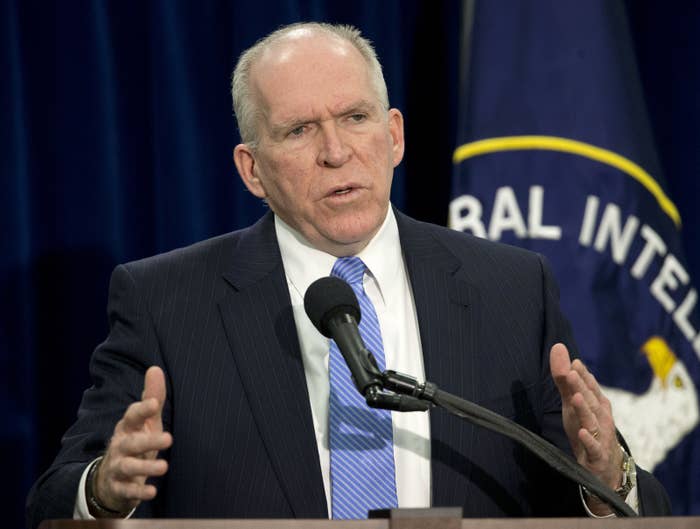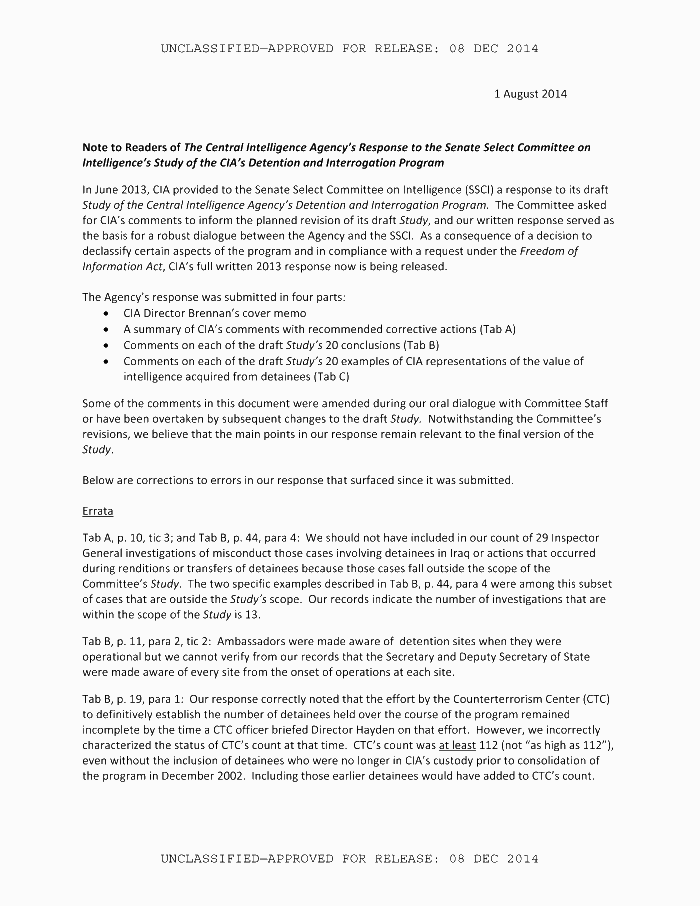
WASHINGTON — The Central Intelligence Agency quietly conceded in December 2014 that several accusations in a scathing Senate Intelligence Committee investigation were in fact true, despite publicly criticizing congressional investigators for a skewed report.
The CIA has for over a year taken issue with the Senate Intelligence Committee’s 6,700-page report on the agency’s torture program, which among other things, claims the CIA mismanaged and abused its interrogation authorities, subjected detainees to torturous interrogation methods and misled Congress, the Justice Department and the White House about the program. In its formal response to the Senate study, dated June 2013, the agency pushed back against many of the study’s claims.
However, in a document released in December 2014 alongside the agency’s formal response to the Senate investigation, the CIA corrected substantial errors in its own response to the Committee, effectively conceding that some of the Senate’s harsh findings were in fact accurate.
“Senior CIA officials who have since been promoted vehemently denied these facts in the summer of 2013,” said a source with knowledge of the Intelligence Committee’s report. “Having the CIA officially admit, to at least some of the factual inaccuracies in their response, is significant.”
The document, entitled “Note to Readers,” was not formally provided or flagged separately for the Senate Intelligence Committee, which only became aware of its existence in the last week -- more than a year since the document was publicly posted.
The "Note" was also noticeably absent from the CIA website's swath of December 2014 releases related to the Intelligence Committee study, and was not mentioned in either of the agency's archived press releases on the subject.
“In December 2014 — more than a year ago — this document was posted on CIA’s public website for the public, the press, and Congressional staff to see,” said Dean Boyd, a spokesman for the CIA. “It was posted at the same time and alongside the Agency’s declassified response to the SSCI Study, a statement from Director Brennan on the SSCI Study, and a CIA Fact Sheet regarding the SSCI Study.”
The “Note” states that the CIA’s revisions came after discussions with Senate Intelligence Committee staff over the CIA’s 2013 response. It also cites a then-pending Freedom of Information Act as reason for the 2013 response being released without the changes.
Among the CIA’s quiet corrections are that it did in fact misrepresent the importance of information obtained from 9/11 mastermind Khalid Sheikh Mohamed, known informally as "KSM," and in some cases, already had certain information that it had previously said was “unavailable” prior to KSM providing it.
It also admits in its “Note” that it misrepresented the number of detainees in CIA custody to its own leadership, and that it did not notify the Secretary of State or Deputy Secretary of State of every black site detention facility.
In one instance, the CIA says, it misrepresented a timeline of information obtained from KSM in capturing an al-Qaeda affiliated terrorist known as Hambali. The issue, it writes in the “Note,” was a “sequencing error.”
“We acknowledge that in various representations, including President Bush’s 2006 speech, CIA introduced a sequencing error regarding [CIA detainee] Majid Khan’s arrest/debriefings, and KSM’s arrest/debriefings,” the CIA’s “Note” says. However, it reads, “our description of the impact of the information acquired from KSM” in capturing Hambali was accurate.
Later in the “Note,” the agency writes in reference to a separate incident regarding the capture of al-Qaeda affiliate Saifullah Paracha, “We incorrectly stated that KSM’s information preceded Majid Khan’s information.”
To translate into English, the information the CIA gained from Khan was obtained before that extracted from KSM. The latter provided them with information that let the CIA realize the significance of what they'd already learned from the former.
One of the report’s defenders said admitting this “sequencing error” is significant, as it undermines a key claim of the agency: that its controversial interrogation methods produced “otherwise unavailable intelligence.”
“The CIA justified this program by claiming that it produced otherwise unobtainable information. CIA officials have now admitted their go-to example was wrong,” Sen. Ron Wyden, a prominent Democrat on the Intelligence Committee, told BuzzFeed News.
“These are significant admissions by the CIA that should not have been hidden in an obscure endnote,” Wyden said. “Director Brennan has tried to insist that the CIA did not provide policymakers with false information about torture, but these corrections seem to be an admission that they did so, and did so repeatedly.”
The Senate Intelligence Committee report on the CIA's now-defunct torture program continues to be a bone of contention between the spies and their chief overseers. Despite continued pushback from the agency over the accuracy of the panel's study, the 500-page executive summary of which was declassified in December of 2014, a government military lawyer said Wednesday that the study was accurate.

